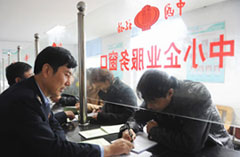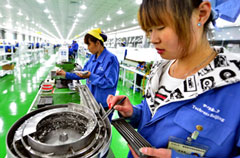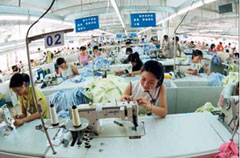 |
|
|
Editor's note: Nearly 99 percent of companies registered in China are small and medium enterprises (SMEs).
Together they account for up to 80 percent of the country's urban jobs and make up 60 percent of China's economic output.
Since the global financial crisis, China's SMEs have been suffering from the lack of financing channels. High tax rates and rising labor costs also dealt them a blow, as has shrinking overseas demand. The State Council, China's cabinet, announced it would suspend value-added and turnover taxes for businesses with monthly revenues below 20,000 yuan, starting from Aug 1. Experts expect the move to ease enterprises' tax burdens and nurture SME growth. |
|
|
 |
|
|
Structural tax cuts boost economic vitality The tax break for small and micro-sized enterprises, which usually accept interest rates 10 to 30 percent above the guideline rate, will ease the credit crunch and inject vigor into job-generating small businesses.>>> |
New tax cuts nurture small business growth Some 6 million small firms' tax burdens will be significantly eased since the State Council,announced in late July a move to suspend value-added tax and turnover tax for businesses with monthly revenues below 20,000 yuan. >>> |
|
Tax reductions pave the way for structural reforms Less tax, simpler taxation system this is China's goal of Value-added tax reform, which replaces business tax with VAT. Official figures show that in the first 5 months this year, companies have enjoyed substantial tax savings. >>> |
Corporate tax higher than OECD average China's corporate tax, at 40 percent, is higher than the average level in OECD countries. Corporate tax in OECD countries was between 24 percent to 27 percent over the past 30 years. >>> |
|
 |
|
|
Small-credit firms extend more loans in H1 China had 7,086 small-credit companies with a total loan balance of 704.3 billion yuan at the end of June. These companies offer financial services for SMEs, people with low incomes and private rural households.>>> |
Small businesses gain a greater access to funds China's equity transfer system for non-listed small and medium-sized enterprises was introduced in Beijing, opening up a national over-the-counter and off-exchange market to satisfy growing financing demand.>>> |
|
The real-term loan rate for small and medium-sized enterprises are about 15 percent at the moment. Bank loans cover more than 90 percent of large enterprises, but only less than 20 percent of smaller companies.>>> |
More small firms allowed to issue bonds China will allow more small businesses to issue bonds as part of efforts to support the private sector in a slowing economy,the National Development and Reform Commission said in a guideline published on its website. >>> |
|
 |
|
|
China's hub of private industry sees the return of an increasing number of merchants to their hometown from overseas, many from Europe.>>> |
 Small business, big dreams Small business, big dreamsThe small fast food restaurant Huang Taiji Traditional Food specializes in traditional Chinese breakfast fare, and also embodies the personal philosophy of its founder He Chang.>>>
|
| Internet start-ups ease employmentpressure
Chinese young people are seriously considering making a living online as the economic slowdown bites China's more conventional jobs market. An Internet business boom has helped create more than 10 million jobs in China, which greatly alleviates current employment pressure.>>> |
New type of venture firm aids struggling startups Innovation Works shows what can happen when the vigor of youth is guided by the steady hand of experience. With the average age of its employees hovering around 27, Innovation Works can be described as a young company, but its founder was born in 1961. >>> |
|
 |
|
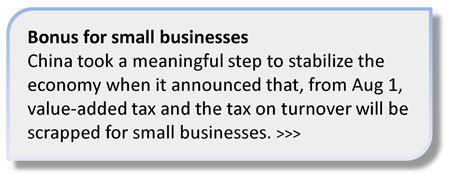 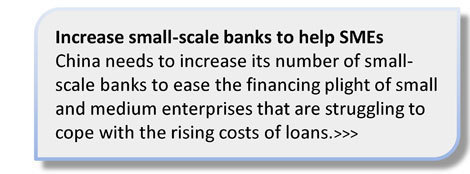 |
|
|
The State Council has decided to waive added-value and turnover tax for small businesses whose monthly revenue is less than 20,000 yuan ($3,258) from Aug 1, a move that will boost the economy and employment.
It's estimated that this policy will benefit more than 6 million small businesses that employ tens of millions.>>>
|
The State Council decided to exempt value-added tax and business tax on small enterprises is a positive step.
But most small enterprises in need find their sales pass the benchmark. The government needs to reform its overall tax structure for enterprises, if it really values their role as important economic growth boosters and job creators.>>>
|
|
The suspension of VAT and turnover tax could benefit 6 million businesses, but steps should be taken to ensure they actually do.>>> |
If China really wants to boost its economy by innovation, consumption and competition, it should relieve this financial burden on citizens and enterprises by cutting taxes.>>> |
|
 |
|
